Heatwave & Wildfires
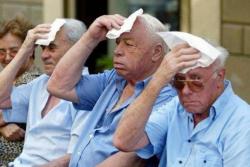 The heatwave that's been gripping Greece since last week broke the country's highest ever temperature on Monday 2nd August 2021. The town of Makrakomi in Greece's Phthiotis region in the Eastern part of the Greek mainland was the hottest place not only in Greece on Monday, but in the whole of Europe as well. The meteorological station of the National Observatory of Athens recorded 46.3° degrees Celsius (115.3° degrees Fahrenheit). This temperature is officially the highest ever to be recorded. The cities of Thebes, Sparta, Dendra and Larissa also recorded temperatures above 44° degrees Celsius on Monday. Greek authorities worry that this record might be broken again over the course of the week, as temperatures are expected to remain very high across the country until Thursday.
The heatwave that's been gripping Greece since last week broke the country's highest ever temperature on Monday 2nd August 2021. The town of Makrakomi in Greece's Phthiotis region in the Eastern part of the Greek mainland was the hottest place not only in Greece on Monday, but in the whole of Europe as well. The meteorological station of the National Observatory of Athens recorded 46.3° degrees Celsius (115.3° degrees Fahrenheit). This temperature is officially the highest ever to be recorded. The cities of Thebes, Sparta, Dendra and Larissa also recorded temperatures above 44° degrees Celsius on Monday. Greek authorities worry that this record might be broken again over the course of the week, as temperatures are expected to remain very high across the country until Thursday.
From Tuesday 3rd August 2021, open-air archaeological sites in Greece, including the Athens Acropolis, will be closed between 12:00 and 17:00 until Thursday 5th August due to the very high temperatures expected this week.
On Tuesday 3rd August, the town of Lagadas, near Thessaloniki, broke the national record yet again by recorded the country's highest temperature, recording a sweltering 47.1° degrees Celsius. Makrakomi in Fthiotida and Arfara in Messinia recorded temperatures of 46° degrees Celsius. Kranidi, Nafplio, Argos, Sparta and Athens recorded temperatures over 45° Celsius today.
A total of 81 fires broke out in Greece in the last 24 hours with firefighters still battling 40 active fronts. The largest and most dangerous of the blazes continued to burn in Athens' northern suburbs, with thousands of people being evacuated from their homes as the fires destroyed property. The island of Evia was also put on high alert as forest fires spread down to coastal villages.
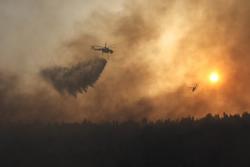 On Wednesday 4th August, firefighters raced to contain a wildfire on the outskirts of Athens that destroyed or seriously damaged dozens of homes overnight, forced thousands to flee and threatened a former royal palace, as temperatures fueled blazes across the country. Greece is enduring its worst heatwave in decades, with temperatures in parts of the country expected to reach +45°C. Fire services took advantage of cooler morning hours to send low-flying helicopters and planes to dump water on charred forests around Tatoi, 20 kms north of the capital, where more than 500 firefighters had battled through the night to contain the blaze. A large wildfire broke out in the region surrounding Ancient Olympia on Wednesday afternoon. Residents in five of the surrounding areas have been evacuated.
On Wednesday 4th August, firefighters raced to contain a wildfire on the outskirts of Athens that destroyed or seriously damaged dozens of homes overnight, forced thousands to flee and threatened a former royal palace, as temperatures fueled blazes across the country. Greece is enduring its worst heatwave in decades, with temperatures in parts of the country expected to reach +45°C. Fire services took advantage of cooler morning hours to send low-flying helicopters and planes to dump water on charred forests around Tatoi, 20 kms north of the capital, where more than 500 firefighters had battled through the night to contain the blaze. A large wildfire broke out in the region surrounding Ancient Olympia on Wednesday afternoon. Residents in five of the surrounding areas have been evacuated.
On Tursday 5th August, a total of 99 new fires broke out, raising the total number of blazes in progress to 145. The Greek Prime Minister stated that saving human lives is the government's top priority, "Homes can be rebuilt, the trees will grow back, but human loss cannot be compensated" adding that "We have a duty to safeguard our country against the reality of climate change." Switzerland and Romania have joined Cyprus, France, Sweden and Ukraine in sending much-needed assistance as Greece battles the devastating wildfires in northern Athens, on the island of Evia and in the Peloponnese. Authorities warned of more blazes on Friday as temperatures hovered around 40° degrees Celsius (107°F) and gale winds were expected. The winds might be helpful in lowering the present heat, but unhelpful in spreading the numerous fires.
On Friday 6th August, the major blaze just north of Athens claimed its first life as flames continued to threaten populated areas and electricity installations. Athens' main trauma hospital reported that a 38-year-old volunteer firefighter had died after a head injury from a falling electricity pole in an area north of Athens. At least 20 people, including four firefighters, have been treated for injuries. Two of the firefighters were in intensive care in Athens, the other two were hospitalized with light burns. The coast guard said 1,400 people had been taken off beaches in the NE of Evia by early afternoon, after flames cut off all other means of escape. A coast guard vessel rescued another 10 people trapped on a beach by a wildfire near Gythio in the southern Peloponnese. Shifting strong winds in the afternoon caused the blazes near Athens and Evia to repeatedly change direction, in some cases returning to threaten areas that had narrowly escaped destruction earlier in the week.
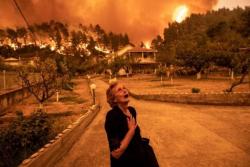 On Saturday 7th August, Greece was fighting for the fifth consecutive day with about 154 fires across the country. Although the heat has dropped a little, the major fires north of Athens, Evia, Olympia and Gythio continue to cause devastation, with major road and rail links being closed to traffic. Multiple people have been linked to arson across Greece in the last few days. Two people were arrested in Agios Stefanos, Attica, where fires are still spreading, the suspects were apprehended with a can of petrol, one claiming he was a volunteer firefighter. Another man was caught red-handed setting fires in dumpsters near Athens. These fires are not all the result of arsonists, the historic heatwave that ravaged the country for days is also one of the main factors that led to this environmental catastrophe.
On Saturday 7th August, Greece was fighting for the fifth consecutive day with about 154 fires across the country. Although the heat has dropped a little, the major fires north of Athens, Evia, Olympia and Gythio continue to cause devastation, with major road and rail links being closed to traffic. Multiple people have been linked to arson across Greece in the last few days. Two people were arrested in Agios Stefanos, Attica, where fires are still spreading, the suspects were apprehended with a can of petrol, one claiming he was a volunteer firefighter. Another man was caught red-handed setting fires in dumpsters near Athens. These fires are not all the result of arsonists, the historic heatwave that ravaged the country for days is also one of the main factors that led to this environmental catastrophe.
Οn Sunday 8th August, hundreds of firefighters backed by planes, helicopters and reinforcements from other countries battled massive wildfires that continued burning, fueled by bone-dry conditions after the country's worst heat wave in decades. Authorities dedicated the most resources to tackling four major blazes, one on the island of Evia and three in the southern Peloponnese. A fifth dangerous fire just north of Athens appeared to be on the wane, after burning dozens of homes and businesses in the northern suburbs of Athens, triggering the evacuation of thousands of people and decimating large tracts of forest, including the Mount Parnitha national park, one of the last forests near Athens. In the afternoon, a PZL aircraft of the 359th Air Service Squadron crashed during aerial firefighting on the island of Zakynthos. The pilot survived and was taken to the General Aviation Hospital.
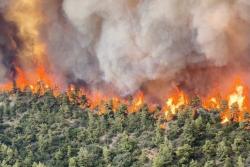 On Monday 9th August, wildfires continued to rip through northern areas on the island of Evia, prompting more residents to flee to safety by sea. More than 2,000 people have been evacuated, with elderly residents carried on to ferries. Local officials said more help was needed to fight the fires that have destroyed parts of the island. The other major blaze in the northern suburb of Athens is said to have subsided. Heatwaves such as this are becoming more likely and more extreme because of human-induced climate change. The subsequent hot, dry weather is likely to fuel more wildfires. Elsewhere in Greece, the fires in the Peloponnese regions of Olympia and Mani are said to be stable. The military and police forces are patrolling the area amid concern that the fires could re-start with the strong winds.
On Monday 9th August, wildfires continued to rip through northern areas on the island of Evia, prompting more residents to flee to safety by sea. More than 2,000 people have been evacuated, with elderly residents carried on to ferries. Local officials said more help was needed to fight the fires that have destroyed parts of the island. The other major blaze in the northern suburb of Athens is said to have subsided. Heatwaves such as this are becoming more likely and more extreme because of human-induced climate change. The subsequent hot, dry weather is likely to fuel more wildfires. Elsewhere in Greece, the fires in the Peloponnese regions of Olympia and Mani are said to be stable. The military and police forces are patrolling the area amid concern that the fires could re-start with the strong winds.
Prime Minister Kyriakos Mitsotakis apologised on Monday for failures in tackling the wildfires that have burned across Greece for the past week as the country counted the cost in lost homes and livelihoods. An EU Recovery Fund will be channelled directly to the reforestation of these regions. The PM noted that Greece was dealing with an unprecidented natural disaster, with 586 wildfires lighting up within a week, and the difficulty in trying to put them all out. Mitsotakis said registration of damages has already begun, and a new platform to be set up would allow those who lost property to directly apply for aid without the obstacle of bureaucracy.
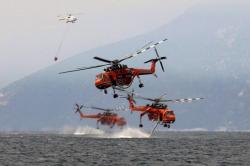 On Tuesday 10th August, Greece has been fighting for the eighth consecutive day with the wildfires, particularly on two main fronts: the north of the island of Evia and the area of Gortynia in the Peloponnesian regional unit of Arcadia. To date there have been a total of 63 orderly evacuations of towns and villages in the past several days while 586 fires had broken out all around the country. According to the latest announcement issued by the National Observatory of Athens, Greece has lost 93,368 hectares (230,717 acres) of forests in 2021 alone. Greek authoroties have emphasized that saving lives was their priority, remembering the deadly 2018 coastal fire in Mati, near Athens, that killed over 100 people, including some who tragically drowned trying to escape the flames and smoke by sea.
On Tuesday 10th August, Greece has been fighting for the eighth consecutive day with the wildfires, particularly on two main fronts: the north of the island of Evia and the area of Gortynia in the Peloponnesian regional unit of Arcadia. To date there have been a total of 63 orderly evacuations of towns and villages in the past several days while 586 fires had broken out all around the country. According to the latest announcement issued by the National Observatory of Athens, Greece has lost 93,368 hectares (230,717 acres) of forests in 2021 alone. Greek authoroties have emphasized that saving lives was their priority, remembering the deadly 2018 coastal fire in Mati, near Athens, that killed over 100 people, including some who tragically drowned trying to escape the flames and smoke by sea.
The heatwave, which started at the end of July, has continued although temperature highs have come down to the high 30°'s C.
The funeral of Vasilis Filoras, the videographer who died while volunteering in wildfire fighting efforts on Friday, took place this afternoon in Athens. At first, Filoras was mistakenly thought to be a volunteer firefighter, however, he was a volunteer videographer who was operating his drones in the wildfire area to assist the authorities to understand the magnitude of the fires they were facing.
On Wednesday 11th August, the fires have continued their destruction for a ninth consecutive day in Arcadia, in the Peloponnese, and in the northern areas of the island of Evia. Both firefighters from Greece and abroad, together with volunteers and residents, kept fighting rekindled and newly created fires overnight, until the planes and helicopters could start flying again in the morning. Lightening strikes ignited new fires west of Athens in the afternoon. The new fire outbreaks are reported to be in six locations in the greater areas of Mandra and Porto Germeno. The Greek fire brigade was on site until sunset with 12 fire trucks and 2 helicopters.
On Thursday 12th August, the fires that broke out a week ago in the areas of Arcadia and Evia, continued their destructive path on Wednesday night into Thursday morning. The biggest problem was around the town of Gortynia, where large numbers of firefighters continually fought to contain the flames. As soon as the sun rose, firefighting planes and helicopters took to the skies and started their operations. The fact that helicopters can take water from the nearby Landon River, meant that they could make multiple flights in a short period of time. Another blaze started in the early hours near Halkidiki, a very popular tourist destination.
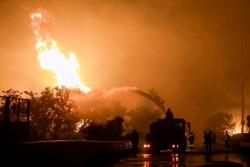 On Friday 13th August, most of the wildfires throughout Greece have now been contained. Strong winds have rekindled some fires, however, firefighting teams are on stand-by to deal with any new outbreaks. Some rain fell in Arcadia to help the firefighting, but the major fires in Arcadia and Mani, in the south-central Peloponnese, continue to burn. The major fires in the northern parts of the island of Evia have now been put out, but new outbreaks still continue. Evia has lost over 50,000 hectares to the wildfires, accounting for more than half of all Greek lossses. The public are asked to show extreme caution and avoid any outdoor actions that may cause a fire through negligence, such as burning dry grass and rubbish, throwing lit cigarettes or use of machines that cause sparks as well as the use of barbeques.
On Friday 13th August, most of the wildfires throughout Greece have now been contained. Strong winds have rekindled some fires, however, firefighting teams are on stand-by to deal with any new outbreaks. Some rain fell in Arcadia to help the firefighting, but the major fires in Arcadia and Mani, in the south-central Peloponnese, continue to burn. The major fires in the northern parts of the island of Evia have now been put out, but new outbreaks still continue. Evia has lost over 50,000 hectares to the wildfires, accounting for more than half of all Greek lossses. The public are asked to show extreme caution and avoid any outdoor actions that may cause a fire through negligence, such as burning dry grass and rubbish, throwing lit cigarettes or use of machines that cause sparks as well as the use of barbeques.
On Saturday 14th August, a new fire broke out in the Mesochoria area in the southern part of Evia. By the afternoon, the village of Mesochoria was being evacuated as a precaution. Firefighters were on the scene quickly, with back-up coming from the northern part of the island. The prevailing high winds, up to gale force, have been a major problem for the fire services today. Earlier in the day a small fire broke out in central Evia, burning farmland and forest, but was quickly contained by firefighters. The Greek PM decribed the recent wildfires as "the greatest ecological catastrophe in the last few decades, which happened during the worst heatwave Greece has suffered for around 30 years". The Hellenic authiorities had faced around 100 active blazes each day.
From Sunday 15th August, the Feast of the Dormition of Panaghia, a national bank holiday, firefighters and volunteers continued to monitor existing fire devastated areas in Greece. Occasional wildfires broke out from smoldering ground that had already been burnt, but rekindled by strong winds in northern Evia and central Peloponnese. A total of 45 wildfires broke out on Monday 16th, in addition to the 96 that firefighters were already dealing with, mostly in the surrounding areas of Athens, including the famous Sounion National Forest. 100's of firefighters, backed by water dropping planes, were fighting a large forest fire burning for a second day on Tuesday 17th, that led to the evacuation of a care home and several villages in the Vilia area, north-west of Athens. On Wednesday 18th, firefighters continued battling the wildfire raging through one of the last pine forests near Athens, fearing that homes could be at risk. Buses were on standby near Vilia, about 60 kms from Athens, to evacuate residents if needed. About a dozen smaller villages have been evacuated since Monday. Over 400 firefighters, assisted by additional firefighters from Poland, 15 helicopters and 6 firefighting planes were despatched to the Vilia area to combat the blazing fires. This pine forest fire continued to burn on a wide front throughout Thursday 19th and Friday 20th August, as strong winds did not help to bring this blaze under control. As firefighters tried hard to contain this fire near Vilia, 41 new wildfires broke out in the last 24-hours, with most being tackled and extinguished in their early stages. The exact causes of some of these wildfires are unknown, but arson is suspected in a number of them, with more than a dozen people being arrested, including a 14-year-old boy who admitted to having ignited 9 wildfires since the beginning of August, because he "liked the flames and the smoke". The forest fires around Vilia continued to burn over the weekend as firefighters tried to bring the numerous blazes under control, however, the danger of new fires remains on 'very high risk' (Category 4) as the continuing high temperatures, strong winds and dry conditions are factors contributing to the new danger. On Monday 23rd August, just days after firefighters managed to put out the devastating wildfire in northern Evia, a new fire started near Marmari, a coastal town in the south-eastern side of the island. Residents of the village of Kokkini were told to evacuate, although the Fire Service said that the flames were not threatening any houses. Firefighters and water bombers arrived at dawn to tackle the fire.
The heatwave and wildfires continued to the end of August, temperatures in the low to mid-30°C, with many wildfires breaking out each day across the mainland and the islands. Firefighters managed to contain and control these smaller fires before they had chance to develop. There has not been a fire season in recent memory like this one, which destroyed five times as many homes and forest areas as previous average seasons. Following critisism on the government handling of the country's wildfires, on Tuesday 31st August, the Greek Government announced new changes in the cabinet. The plan is to create a new Civil Protection Ministry that will have responsibility for the Fire Brigade. The Ministry will help to reorganise all fire fighting methods in the future.